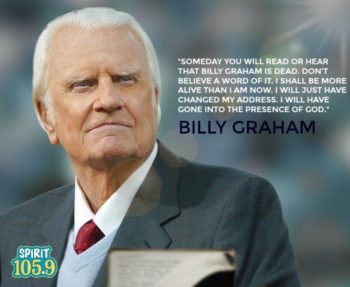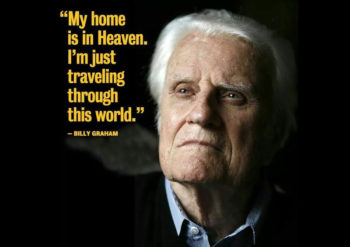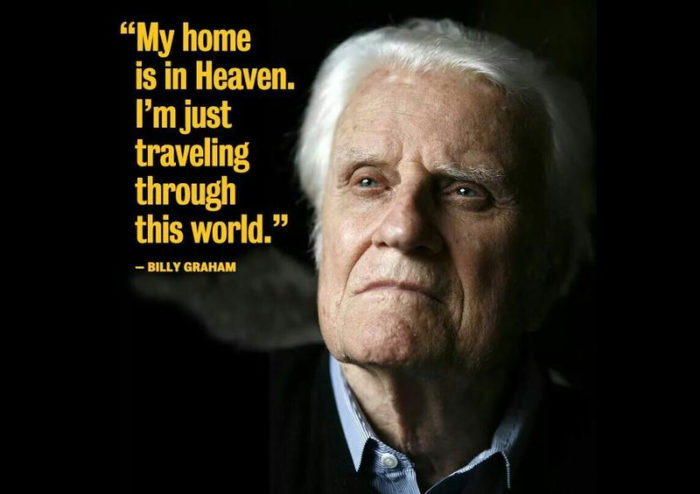Billy Graham is Home, but Not Home Yet
Billy Graham has died.
We all heard the Feb. 21 news and most of us posted the many articles, like this one.
Graham died old and full of years. Most of those years he spent overtly preaching the gospel. This is not social or political causes, not religious morality, but the pure and simple gospel.
This is the core of Christianity.
This is the message Jesus Christ himself came to teach directly and tell stories about, and then to live, die, and resurrect to secure: the fact that God is good, humans are evil, and we’re made to be loved by God, so we must repent of our evil and receive saving grace through Jesus Christ, God’s son.1

They don’t make book covers like they made ’em in the ’70s. Rejoice.
Graham also wrote plenty of books on Christian topics. I recall reading only one, the blessedly thriller-movie-esque-titled Angels: God’s Secret Agents (1975). I don’t remember much about it, just as I don’t remember much, if any, of Graham’s overt influence in my life.
Rather, Graham’s influence has been subtle. It’s the kind of sway you sense is behind a lot of your life and society. If not for Graham, we probably wouldn’t have a lot of the Christian gifts we take for granted: evangelical subculture, for all its faults; multiple denominations of churches, aided by Graham’s popularity; and Christian media, including the Graham-founded Christianity Today magazine.
Without Graham helping to build Christian culture in the U.S., we would likely not have most of modern Christian-made fantasy, such as Frank Peretti’s novels about “God’s secret agents.”
Since last week, we’ve seen many more written and video testimonies from people who received salvation in Jesus thanks to the Holy Spirit’s work through Graham’s ministry.
We’ve also seen many memes with Graham’s quote(s) about how he anticipates Heaven.2 And indeed, Heaven is where Billy Graham is today. For every Christian, Heaven is our eternal home. Or our eternal Home, capitalized, as many Christians do when they’re trying to get poetical about eternity. As in: she’s gone Home. Or: today all the suffering makes me long for Home.
And yet: is that the end of Billy Graham’s story? Does he go up/over/across to Heaven, just as all Christian do after death, and then that’s it? No further action? No developments?
Was Graham right to say: “My home is in heaven. I’m just passing through this world”?
 Or when he said, “This world is not our home; our citizenship is in heaven”?
Or when he said, “This world is not our home; our citizenship is in heaven”?
Or when he said, “Someday you will read or hear that Billy Graham is dead. Don’t you believe a word of it. I shall be more alive than I am now. I will just have changed my address. I will have gone into the presence of God”?3
I must contend the Bible actually presents two equal and glorious truths:
- Right now, a home in Heaven is so perfect, in Jesus’s presence, that nothing is better.
- In the future, Heaven will get better anyway (and will even unite with this world).
Scriptural evidence for each statement is bountiful, but I’ll overview just a few verses.
First, near the Bible’s end, it’s clear that in some sense, even people who have died and gone to Heaven have been awaiting something—the fulfillment of God’s promise to avenge evil on Earth. In some way, they’re aware of events. In some way, they “lack” this resolution:
When he [the Lamb, a symbol of Jesus] opened the fifth seal, I saw under the altar the souls of those who had been slain for the word of God and for the witness they had borne. They cried out with a loud voice, “O Sovereign Lord, holy and true, how long before you will judge and avenge our blood on those who dwell on the earth?” Then they were each given a white robe and told to rest a little longer, until the number of their fellow servants and their brothers should be complete, who were to be killed as they themselves had been.
(Revelation. 6:9–11)
This cry of “O Sovereign Lord … how long … ?” echoes from the Psalmists and prophets of the Old Testament. Somehow, even in the paradise of Heaven, near God’s very throne, these souls are on the edge of their seats. They can’t wait for the end to this plot thread. In fact, for them this unresolved story is personal, because they themselves were martyred on Earth.4
But isn’t Revelation only symbolic? Yes/no/kind of/depends?
Working backward, we find the apostle Paul being even clearer in a genre form that isn’t mixed with apocalyptic images: didactic, apostolic teaching. Paul says:
For we know that if the tent that is our earthly home is destroyed, we have a building from God, a house not made with hands, eternal in the heavens. For in this tent we groan, longing to put on our heavenly dwelling, if indeed by putting it on we may not be found naked. For while we are still in this tent, we groan, being burdened—not that we would be unclothed, but that we would be further clothed, so that what is mortal may be swallowed up by life. He who has prepared us for this very thing is God, who has given us the Spirit as a guarantee.
(2 Corinthians 5:1–5)
Comparing Paul here with his own words of 1 Corinthians 15, we see that he’s talking about physical resurrection. That’s the biblical Christian belief that people don’t just die, leave their bodies, and go to Heaven as souls. Each one is destined to reunite with that same physical body, only Spirit-upgraded, which the apostle Paul calls a “spiritual body” (1 Cor. 15:44). Here, Paul says if your earthly “tent” or home (that is, your body) is destroyed, we don’t look forward to being “naked” in Heaven (that is, without a body). Instead, we want to be further clothed—a reference to the super-embodiment of resurrection.
Here we see this again: Yes, Heaven now is incredible. Even if we don’t have a body, we’re present with the Lord, and that is “far better” (Phil. 1:23). But that’s not the fixed nature of Heaven. We’re not fully home yet, unless we are “further clothed” in resurrected bodies.
Jesus himself exists in Heaven, still the God-Man, still with his same, eternal resurrection body. So we know these can exist in Heaven. But God’s word also promises that Heaven itself is due for a supernatural upgrade, a kind of “resurrection” (though clearly without death that precedes resurrection). In fact, the Earth itself will “die” and yet not be forever obliterated any more than a human being would be obliterated. Again, Paul explains:
… For the creation waits with eager longing for the revealing of the sons of God. For the creation was subjected to futility, not willingly, but because of him who subjected it, in hope that the creation itself will be set free from its bondage to corruption and obtain the freedom of the glory of the children of God. For we know that the whole creation has been groaning together in the pains of childbirth until now. And not only the creation, but we ourselves, who have the firstfruits of the Spirit, groan inwardly as we wait eagerly for adoption as sons, the redemption of our bodies. (ESV)
(Romans 8:19–23; emphases added)
Here the apostle is clear: “the creation … the creation … the creation itself” awaits its freedom, in the exact way God’s people await “the redemption of our bodies,” that is, physical resurrection. If we die, so does creation. If we live again, so does creation.
Compare that with Isaiah 65’s promises of a “New Heaven and New Earth,” coupled with Revelation 21’s echo of this same phrase and glorious fulfillment under King Jesus, then the fact becomes clear: though Heaven is amazing, Heaven isn’t even in its final form. Heaven will morph—be supernaturally changed—blended, united, with this very renewed universe, “the creation itself.” This will make the true, eternal Home of New Heavens and New Earth.
That means we can say “our citizenship is not in the world,” if by this world we mean this present, sinful, groaning age. But we can also say “our citizenship is in this world,” if by this world we mean a physical, beautiful and good universe, wholly renewed by King Jesus.
And then, by the way, we can explore possible answers to questions like “could animals, including dead pets, go to Heaven?” or, “will we eat in Heaven?” or one of my favorites, “can we have amazing stories in Heaven?” If by “Heaven” we mean today’s Heaven, the jury’s still out. But things are slightly more definitive for New Heavens and New Earth.
That’s why I say that yes, Billy Graham is already home. He’s home in Heaven today, worshiping Jesus and meeting the many people he’s helped bring there. That is amazing.

Divine plot twist: Billy Graham will return.
But Billy Graham is still not yet home. Billy Graham wasn’t just passing through this world and his citizenship isn’t just in an out-there Heaven that will never get better. In fact, he will return, just like Jesus will return. He’ll land back on this world—a new Billy Graham for a New Earth. He’ll change his address again! He’ll be re-embodied, looking like those photos we’ve seen, but surely full of more energy and youth and age-wisdom than ever before.
And if you believe in the Jesus whom Billy Graham loved, and the gospel Billy Graham lived to preach, then someday you can also land on New Earth with that same crowd of saints. You can live forever in this heavenly paradise, where we can live, love, sing, create, work, and go on adventures beyond our wildest dreams, all for the glory and honor of King Jesus.
- This biblical gospel leads to plenty more fruits, including certain social pursuits, a Christ-centered view of all things, and plenty about Jesus’s continuing work through his ambassadors in the church. ↩
- Contrary to several style guides, I’ll capitalize the term Heaven, the same as New Earth, just as I would capitalize any other proper-noun-place name. Credit to Randy Alcorn, author of Heaven, for this seemingly self-evident style choice. ↩
- It turns out Graham actually modernized this quote from his predecessor evangelist, D. L. Moody. ↩
- This text also hints at several myths we believe about the present-day Heaven: First, that people there have their memories erased, or erased about evil deeds. Second, that knowing about evil would somehow “taint” their positive eternal experience. Third, that Heaven is essentially timeless, whereas here events happen in sequence: a seal unopened and then opened, then souls cry out, then they’re asked to wait longer—a clear time reference—until God’s plan to “complete” this number of martyrs is finished. ↩










































Stephen, you said, ‘Or when he said, “This world is not our home; our citizenship is in heaven”?’
Well, yes, we can know he was right because that’s precisely what Scripture says. Not, “our citizenship is in New Earth.” I find it very sketchy to make affirmations that contradict what the Bible says! We only know certain things with certainty about life after this life, and we should not discard the very words that God’s Spirit breathed into Paul that we might have a right focus and orientation.
Becky
And yet, I don’t contradict what Graham said there. What I’m suggesting is a second look at the assumptions we might read into that last term, that is, “heaven.” Our citizenship is indeed there. Scripture is so clear on this. And yet Scripture is equally clear about the future of this planet and its future combination with Heaven. At that point, Heaven has not ceased to be Heaven, or become anything less than Heaven–the very presence of God. It has simply filled the whole Earth with the knowledge of the glory of the Lord, as the waters cover the sea (Habakkuk 2:14). I know of no other way to understand this and other prophecies than a literal fulfillment.
That’s just it: we don’t knows. Scripture doesn’t give us a lot about what it will be like, and I think we are wise to keep it there, in the “I’ll trust God for that” pile. I think it’s unwise to speak dogmatically about what we don’t know.
Becky
Indeed, there’s much we don’t know. But based on the above clear texts, there’s also much that we do know, including the fact that “the creation itself” longs for its redemption just as humans do, and that something of human culture (kings, glory of the nations) will last into the Kingdom.
I suppose we’ll need to leave it at that (comparatively mild, thank God) disagreement, as we have before. 🙂
…..I like the differentiation of using “The Spirit world” to emphasize that Paradise and The New Heavens and Earth are different places. One of my frivolous works attempts to describe my own entry into the New Jerusalem, meeting my Master face to face in an unexpected place, and where I go from there. (“My Someday Journey. “) I have a large work in progress (“Nym is Blue”) in which a college student meets a high fairy and they are shocked to receive a mutual vision revealing they have a shared destiny having to do with the very creation of the New Heavens and New Earth, assisted by a fiesty little nine inch sprite. Almost everything I write is of this nature since I had an experience much like Paul of Tarsus that gave me unshakeable faith, endless joy and hope, and a loving desire to reveal the reason for what I have to others.